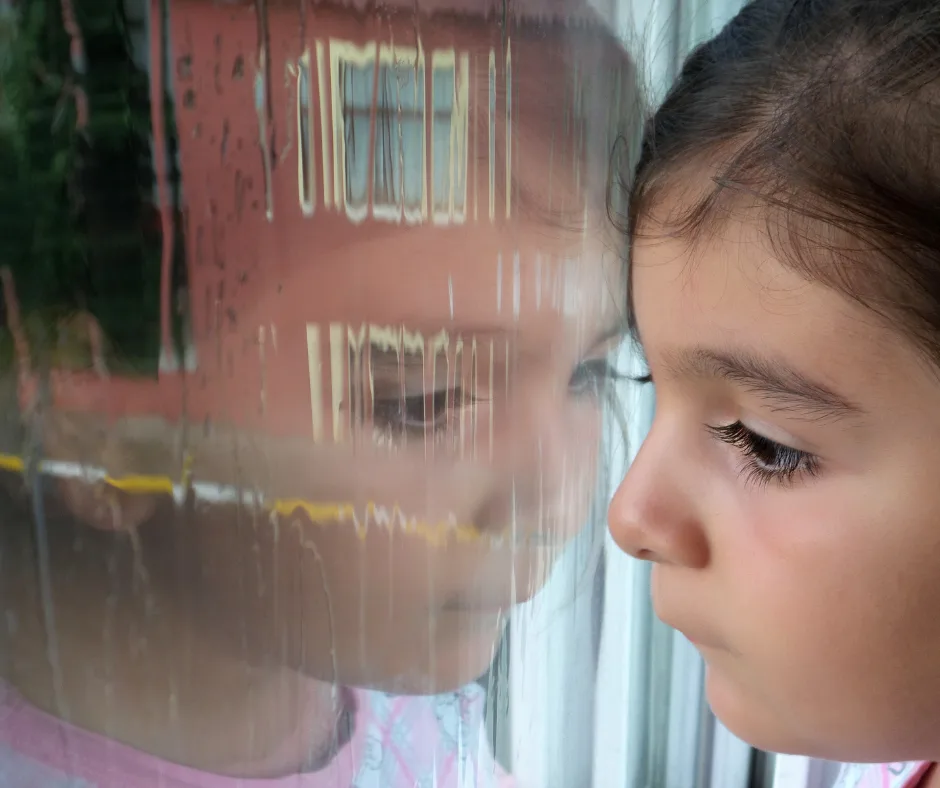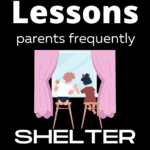Many parents shy away from these 5 tough love measures and, in result, raise a sheltered child. In reality, these acts actually contribute to resilient and emotionally healthy kids.
Some birds teach their offspring how to fly by gently nudging them out of the nest.
Male foxes hide food from their pups, so that they have to hunt for it on their own.
While these natural events might seem a little harsh, tough love is a part of nature.
However, many modern parents feel very conflicted using any type of tough love – and result in sheltering their children.
Instead of seeing the big picture – such as long-term happiness and life skills, parents (including me) are blinded by the immediate present.
When our children have to overcome situations, use problem solving skills, and step out of their comfort zone, they are learning huge lessons and life skills that can’t be taught otherwise.
But why do we feel guilty if our child feels even the smallest amount of discomfort or struggles?
Related: How to Set Your Child up to Have a Beautiful Adulthood

Dangers of a Sheltered Child
As parents, it’s normal to feel responsible for sheltering your children from uncomfortable experiences.
However, sending an older kid out into the world unprepared will result in many more agonizing and disturbing situations.
Many turn to hovering over their children’s every move to protect them from any negative situations. This is referred to as helicopter parenting.
Read the 8 signs that you may be a helicopter parent.
Some signs that your child is sheltered includes:
- You frequently catch them in lies
- Your child finds any excuse to leave your house
- You designate who their friends are
- They aren’t given age-appropriate independence
In fact, sheltered kids are more prone to depression, shame, and insecure attachments when they are older.
5 Common Things Parents Shelter Kids From
Parents can avoid raising sheltered kids by consciously letting their kids cope with these 5 simple concepts.
1) Waiting
Many modern parents feel guilty making their children wait for anything in life.
When I was 8 years old, I wanted Magic Nursery Triplet Dolls with every fiber of my being. I gained the confidence to ask my parents for these dolls once summer night.
Related: Why I am Raising my Kids Like It’s the 90’s.
They replied, “maybe you can get it for Christmas.”
For the next 7 months, every time I played house with my sisters, I pretended like I was pregnant with those triplets.
When I finally received my new dolls, I felt like all of my wildest dreams came true. This level of appreciation came from waiting – and not getting everything instantly.

2) Boredom
What do you remember from your childhood?
Organized events? Probably not.
I remember the slow summer days where my sisters and I had nothing planned and invented a new game.
Though, many parents feel like failures when children are bored, studies link boredom to creativity.
One British study asked subjects to complete a creative challenge (coming up with a list of alternative uses for a household item). One group of subjects did a boring activity first, while the others went straight to the creative task. Those who are bored are more productive and efficient.
Related: The Beautiful Benefits of Boredom
3) Arguments and Conflict
Stop viewing conflict in your child’s life as a bad thing.
Working through arguments and conflicts teach children important life and coping skills.
Step away and allow your child to have healthy fights with other children.
Conflict will always be a part of life, and sheltering your child from it will not teach them how to deal with it.
Check out these 5 Conflict Resolutions Skills to Teach Kids.
4) Helping Out
When I bring groceries home, I sometimes feel the urge to tell my children, “just relax, I got it.”
However, I need help, and they need to learn to help.
Why do parents overlook such a simple concept?
Research suggests that children who do chores have higher self-esteem, are more responsible, and are better equipped to deal with frustration. Additionally, these skills can lead to greater success in school, work, and even relationships.
Encourage your children to help out at home with this chore chart and age-appropriate chore ideas.

5) Disappointment and Loss
It is said that Thomas Edison failed 1000 times before successfully inventing the the light bulb. When asked how it felt to fail 1,000 times, Edison simply said, “I didn’t fail 1,000 times. The light bulb was an invention of 1,000 steps.”
I am just saying.
Grit, or strength of will, isn’t necessarily about coming in first place or earning the big bucks. It isn’t about the outcome.
It is about the process.
Emotionally unstoppable kids all have one thing in common: they are given the opportunity to fail and learn to get back up again.
Final Thoughts on Lessons for a Sheltered Child
You don’t have to shove your kids out the front door like the mama-bird does to her offspring, but if you want to raise emotionally healthy kids it is important to back off a little and let them experience real life.
Raise kids who are healthy at home, and strong in the world with these and more tips. Follow us on Facebook for updates!


Raise Kids who Come to You With Problems, Not Hide From You - Simply Rooted Family
Wednesday 23rd of March 2022
[…] You may also like: 5 Topics to Stop Sheltering Your Kids From […]
Justin Rickey
Friday 4th of March 2022
The was a great read and very interesting. There are so many things that can come from not sheltering kids.
alita
Thursday 3rd of March 2022
Such an excellent post. As a new parent, I find this resource really helpful. Dont be a fraid to back off a little and let the kids experience real life
Marjie Mare
Thursday 3rd of March 2022
This post speaks to me and brings back memories of when I was raising my kids. I will share it with my sister.
Knycx Journeying
Wednesday 2nd of March 2022
These tips are very useful and I think a lot of parents will be inspired by it. The mental health of children is also very important and we need to pay attention to that too.